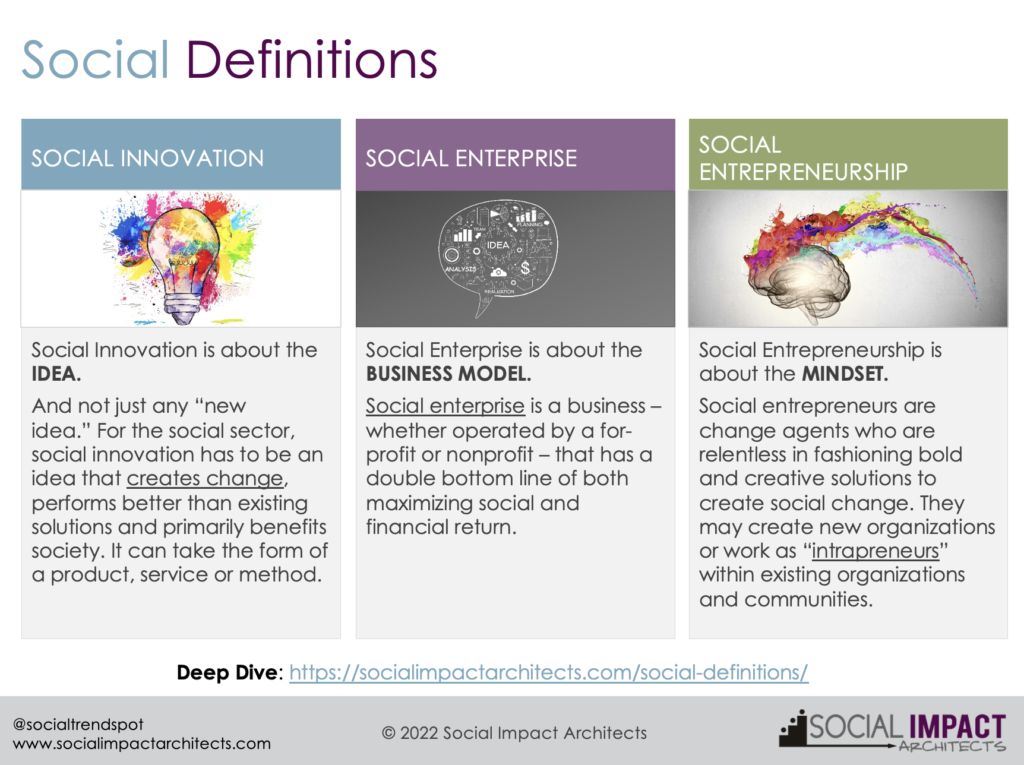 I am often asked how I come up with blog topics. To answer, some come from collective client work, some are sparked by life experience and others are inspired by great questions from audience members. Since I’ve been back out doing speeches, workshops and keynotes, audiences have been asking me this burning question: What is the Difference between Social Innovation, Social Enterprise & Social Entrepreneurship? This question always reminds me how important storytelling is to our culture. As more people join the club we call “social entrepreneurs,” the greater our need is for common social terminology. More importantly, we need common definitions for the terms we use or we risk them becoming meaningless.
I am often asked how I come up with blog topics. To answer, some come from collective client work, some are sparked by life experience and others are inspired by great questions from audience members. Since I’ve been back out doing speeches, workshops and keynotes, audiences have been asking me this burning question: What is the Difference between Social Innovation, Social Enterprise & Social Entrepreneurship? This question always reminds me how important storytelling is to our culture. As more people join the club we call “social entrepreneurs,” the greater our need is for common social terminology. More importantly, we need common definitions for the terms we use or we risk them becoming meaningless.As a serial social entrepreneur for nearly three decades, I have started many social enterprises and come up with many socially innovative ideas. I have not only studied the nature of the work, but I have also practiced it, on my own, with clients and with students in my MBA classes. Drawing on my experience in the field, I have developed a simple construct to help unite us and showcase the three main approaches to social change:
Social Innovation is about the IDEA.
And not just any “new idea.” For the social sector, social innovation has to be an idea that creates change, performs better than existing solutions and primarily benefits society. It can take the form of a product, service or method. For example, a cell phone isn’t a socially innovative product by itself but it can be used to diagnose disease. Pay-for-success is an innovative method used to pay for socially beneficial improvements. Ultimately, to truly claim the highest standard of social impact, innovative ideas must be tested for impact and ideally scaled through an open-source construct, which improves over time.
Social Enterprise is about the BUSINESS MODEL.
Social enterprise is a business – whether operated by a for-profit or nonprofit – that has a double bottom line of both maximizing social and financial return. While social enterprise may use some philanthropic dollars in the start-up phase or for special projects, it is designed to become a self-sustaining, market-based business model. A social enterprise might or might not be socially innovative. Some of the most successful social enterprises are, in fact, not socially innovative (e.g., thrift shops, restaurants).
Social Entrepreneurship is about the MINDSET.
Social entrepreneurs are change agents who are relentless in fashioning bold and creative solutions to create social change. They may create new organizations or work as “intrapreneurs” within existing organizations and communities. Social entrepreneurs may or may not work for a social enterprise, and their idea may or may not be socially innovative. For example, they may work for a Fortune 500 company or be a rabbi at a synagogue. What defines social entrepreneurs are the three main principles they follow: 1) They fall in love with the problem and not the solution. 2) They believe no one owns a social solution. Instead, it should be co-created with the community to ensure sustainability and impact using a change management philosophy. 3) They know impact is the bottom line of the social sector. They are both visionary and disciplined in their approach. They don’t rely on innovation and invention alone; they prove impact and pursue scale using models such as lean-start-up and social alchemy.
What brings us together in the social sector is our common belief that social change is essential to creating a society in which everyone prospers. And each time I define these to an audience or a new class of future social entrepreneurs, I am hopeful for the day when social change is no longer discussed separately from other forms of business or entrepreneurship, because every business impacts and determines outcomes for people in our communities. We just want that impact to lead to positive societal change. We’d love to hear your thoughts on these definitions and why these distinctions matter to our collective work.


Thank you (as always) for this very descriptive article explaining these three categories. I get asked this ALL the time-especially when I am out talking with the community about the Social Enterprise Alliance-Greater Cincinnati Regional Chapter. Now I can refer them directly to your blog. We sure do appreciate the work you do!
Thank you for breaking down and giving details about each topic.